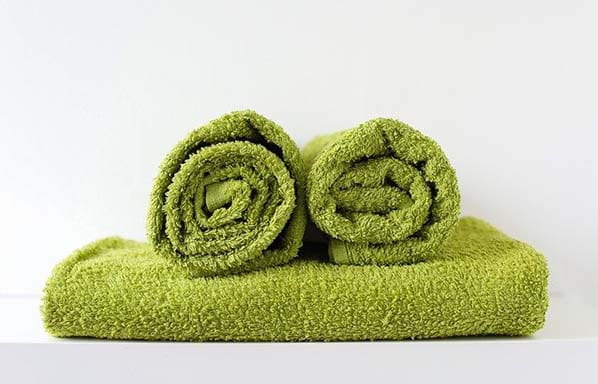Towels, even when they are already of good quality, always end up feeling softer over time. Some can also gradually lose their absorption capacity and end up in the back of the cupboard because you just don’t want to use them anymore. How to recycle old towels? In this article, we’ll start by explaining how to find the softness of your linens with a few tips. And if you think they are really too worn out, we’ll give you some recycling ideas for everyone.

Linen too rough: a trick to restore them to their initial texture
When you realize that some towels and sheets are getting old, start with a first machine wash. Instead of the classic detergent, use white vinegar that you pour into space traditionally dedicated to liquid detergent.
Then perform a second wash, always at a high temperature. And this time, instead of the lye, use baking soda. This will prevent the textile from retaining bad odors, and it will make it much softer.
Later, to better maintain your laundry regularly and avoid having to consider a new attack program with two complete cycles to follow, consider diluting a tablespoon of white vinegar or baking soda with your laundry before each cycle. And to save money, swap the classic fabric softener for lemon juice. It’s natural, chemical-free, and just as effective for smelling laundry!
How to better maintain your linens?
In order to extend its lifespan as much as possible, your household linen deserves appropriate maintenance. With this in mind, we recommend that you avoid overloading the device as much as possible when you turn it on. An overfilled machine is less efficient at removing dirt and rinsing laundry residue. In the dryer, if you make the same mistake, your laundry will lack air, and its fabric will not be able to regain all its flexibility.
When placing your towels and other duvet covers in the dryer, feel free to use a tennis ball or two. They will help soften the fibers while reducing the risk of friction between the different items of laundry.
Ideally, it is also recommended to favor drying at low temperatures with slower rotations. To use the dryer for a shorter period of time and take better care of your household linen, nothing prevents you from shortening the cycle and continuing to dry in the open air. This will also save you money. ‘electricity.
Some ideas for recycling towels
Are your towels really too worn out? Can’t you reuse them as bathroom linen? No need to throw them away; you can still give them a second life.
Cleaning cloths
Why spend money on mops when you can even turn your old textiles into rags? If you use specific brooms to clean floors, measure them to cut a mop to the correct dimensions. Even if used towels dry the skinless easily, they are still very effective in getting rid of dirt stuck to the floor.
An organizer for toiletries
By making a few seams, you can create practical pockets with several compartments on the towels. You are free to imagine the different storage pockets according to your own needs. This can allow you to have a new sorting space available for the bathroom, but also to more easily carry the toothbrush and toothpaste when you go on a trip, for example.
Puppets for children
It will take a little longer for this recycling job, but you will be rewarded when you see the eyes of the little ones shining with joy. Prepare them puppets in the shape of characters or animals, in the colors, and with the look you want. The only limit is your imagination! Slightly worn washcloths are also an ideal raw material for creating colorful little characters.
Washable makeup remover cotton
To reduce the weight of your waste as much as possible, have you ever thought about replacing disposable cotton with washable alternatives? You can cut out old napkins to make your own. In order to personalize them, do not hesitate to sew them with another colored fabric by recovering damaged clothes or old sheets, for example.
Dresses to dry quickly at the beach
There are some very simple tutorials to follow for making beach dresses with towels. Right out of the water, you can put them on to avoid getting your clothes wet when you get dressed later. Here again, a few more scraps of fabric are sufficient to sew suspenders.